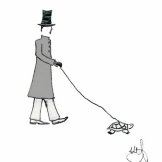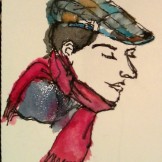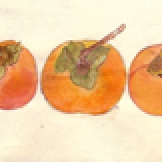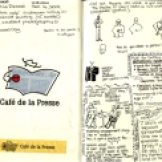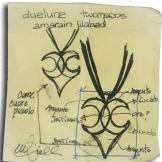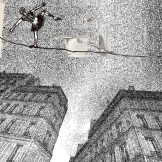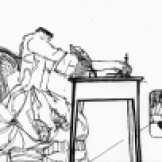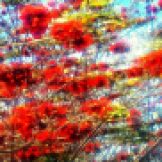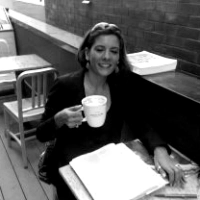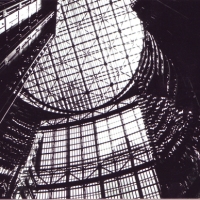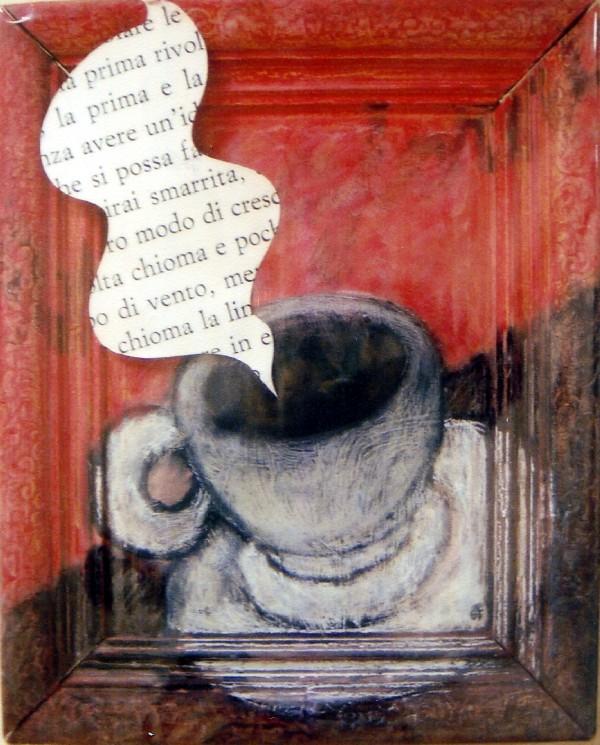
The Flâneur. Ink on trace paper. February 26, 2011
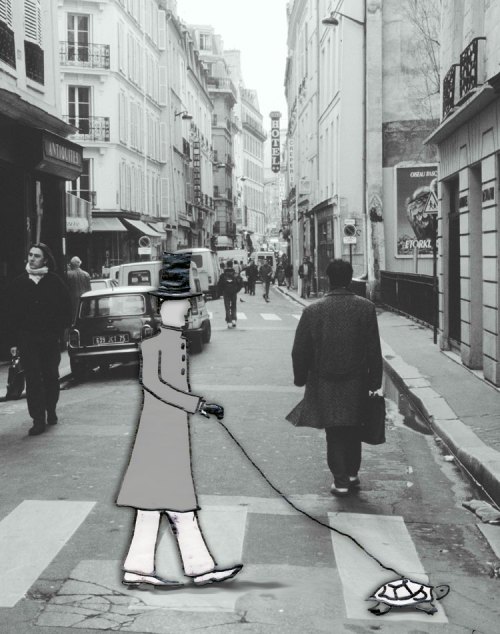
The Flâneur and his turtle in the streets of Paris. Digital collage. February 26, 2011. Background photo from San Francisco’s artist David Blumin. Click for his website.
Post updated 11.01.2021
Then I heard the phrase ‘Walk with a turtle’ on NPR, during
an interview with Council of Dads’ author Bruce Feiler–and had an epiphany: I, too, had been a flâneuse in my early years. When I was 9 years old I used to tie a red ribbon to the shell of my turtle Stefania/Stefano (we are still not sure) and take her for ‘walks’ around my building and in the field of olive trees nearby. This cannot just be explained by mere coincidence or a sense of equanimity (i would take my giant schnautzer Zorro for walks- or rather, he would take me- and treated Stefania/Stefano to the same). By walking the city (ok , in my case the field of olive trees) at the pace of a tortoise, we are bound to pay attention to life around us, to read the city–not just skim it from the wheel of our car or glancing up from smartphones while we traverse sidewalks. Having a turtle as a guide nudges us to stop rushing. I am reminded of the
buddhist monk in the documentary ‘Baraka’, slowly pacing the street with small steps , at the sound of a bell–in the midst of a hyperactive Japanese metropolis. The realization of possible multi-layered readings on the figure of the flaneur prompted a small research. Here is a documentary on
Walter Benjamin’s Flâneur and Paris.
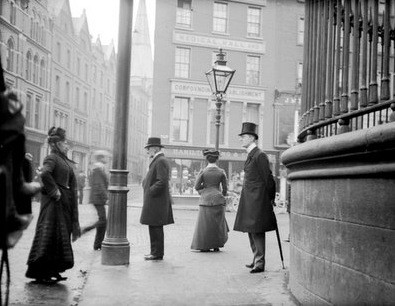
Historical evidence of The Flâneur? Or just man waiting for his wife? Undated image from: storify.com/virtualdavis/flaneur
The Flâneur
The term comes from ‘flâner’, which means to stroll in French. From this verb Baudelaire coined the word flâneur, a person who walks the city in order to experience it. The flâneur is driven by an insatiable hunger for passion; he seeks the streets and the city life for they provide inspiration and cure him of the malaise and loneliness of being human. He practices mindfulness, or conscious dilly-dallying. In US they would call him a ‘loiterer’, surely shoo him away…or perhaps fine or even jail him (I always tell my students there is no such thing as the word ‘loitering’ in Italian….what else would we do in Piazzas!?). My friend Bruce and I were discussing the flâneur few days ago and he reminded me of the symbology of the turtle and this quote from Rumi:
The soul needs as much time to wander as the feet.
Rumi
Baudelaire writes of the flâneur:
The crowd is his element, as the air is that of birds and water of fishes.
His passion and passionate spectator, it is an immense joy to set up house in the heart of the multitude, amid the ebb and flow of movement, in the midst of the fugitive and the infinite.
To be away from home and yet to feel oneself everywhere at home; to see the world, to be at the centre of the world, and yet to remain hidden from the world
impartial natures which the tongue can but clumsily define. The spectator is a prince who everywhere rejoices in his incognito. The lover of life makes the whole world his family, just like the lover of the fair sex who builds up his family from all the beautiful women that he has ever found, or that are or are not -‐ to be found; or the lover of pictures who lives in a magical society of dreams painted on canvas.
A Process of Navigating Erudition
From Wikipedia: Flâneur is not limited to someone committing the physical act of peripatetic stroll in the Baudelairian sense, but can also include a “complete philosophical way of living and thinking”, and a process of navigating erudition as described by Nassim Nicholas Taleb’s essay on “Why I Walk” in the second edition of The Black Swan (2010). A Sunday Time review called The Black Swan one of the twelve most influential books since WWII.
Benjamin in his Arcades further describes the flâneur utilizes the city, which becomes an extension of his residence:
The street becomes a dwelling for the flâneur; he is as much at home among the facades of houses as a citizen is in his four walls. To him the shiny, enameled signs of businesses are at least as good a wall ornament as an oil painting is to the bourgeois in his salon. The walls are the desk against which he presses his notebooks; news-‐stands are his libraries and the terraces of cafés are the balconies from which he looks down on his household after his work is done.
Some of the questions I have been thinking about are : Can the flâneur be a flâneuse? Must he or she always haunt the city aloof and alone, or is ‘Flâneurie’ an activity that can be enjoyed in small groups, maybe of separate actors, each with his or her own turtle?
The flâneur is enjoying immense popularity on the Internet and blogosphere, among the hipster and (pseudo)intellectual crowd. He is radical chic, a gentleman stroller whose eccentricity is afforded to him by indipendent wealth. He is a man of leisure who can make a statement about the bondage of work and busyiness: he is above it and does not need it.
On the other side of the coin, we might re-evaluate the ‘homeless’ people, the figure of the clochard (sounds better in French doesn’t it) as flâneurs without means, but with the same intellect and intent. They also make the city their living room and library.
In “American Flaneur: The Cosmic Physiognomy of Edgar Allan Poe“, James V. Werner describes how ‘ highly self-aware, and to a certain degree flamboyant and theatrical, dandies of the mid-nineteenth century created scenes through outrageous acts like walking turtles on leashes down the streets of Paris. Such acts exemplify a flâneur’s active participation in and fascination with street life while displaying a critical attitude towards the uniformity, speed, and anonymity of modern life in the city.’
Hmm…Sounds like The Situationists.
A new interpretation of the activities of the flâneur appear in the writings of Guy Debord, the dérive also being a protest against the processes of consumption and capitalism:
One of the basic situationist practices is the dérive [literally: “drifting”], a technique of rapid passage through varied ambiances. Dérives involve playful-constructive behavior and awareness of psychogeographical effects, and are thus quite different from the classic notions of journey or stroll.
In a dérive one or more persons during a certain period drop their relations, their work and leisure activities, and all their other usual motives for movement and action, and let themselves be drawn by the attractions of the terrain and the encounters they find there. Chance is a less important factor in this activity than one might think: from a dérive point of view cities have psychogeographical contours, with constant currents, fixed points and vortexes that strongly discourage entry into or exit from certain zones.
–Guy Debord
While the flaneurs practiced ‘aimless wandering’, the Situationists devised processes to purposefully get lost.
There is no English equivalent for the French word flâneur. Cassell’s dictionary defines flâneur as a stroller, saunterer, drifter but none of these terms seems quite accurate. There is no English equivalent for the term, just as there is no Anglo-Saxon counterpart of that essentially Gallic individual, the deliberately aimless pedestrian, unencumbered by any obligation or sense of urgency, who, being French and therefore frugal, wastes nothinincluding his time which he spends with the leisurely discrimination of a gourmet, savoring the multiple flavors of his city.
Cornelia Otis Skinner.
Elegant Wits and Grand Horizontals, 1962
Watching is the chosen pleasure of flâneur. He is an ‘urban stalker’, as Susan Sontag defines him in her 1977 essay On Photography. Modern flâneurs, let’s arm ourselves with cameras or a moleskine . Let’s pretend we are all ‘The Sartorialist’ and many, many other envoys on particular missions. Would you enjoy the streets of your city if you thought you were spying on someone, an urban detective, privy to secrets no-one else can know? What would the intelligence gathered from today? What stories could you tell(or draw)? What stories would the city reveal to you. There is so much life out there. And buildings are lessons.
Let the urban voyeurism begin.
Here are some useful links:
Delicious books on the subject:
And, finally, my very own books for Parisian flanerie.
Read Full Post »



































